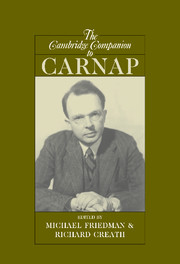
-
Select format
-
- Publisher:
- Cambridge University Press
- Publication date:
- April 2008
- December 2007
- ISBN:
- 9781139001649
- 9780521840156
- 9780521549455
- Dimensions:
- (228 x 152 mm)
- Weight & Pages:
- 0.69kg, 390 Pages
- Dimensions:
- (228 x 152 mm)
- Weight & Pages:
- 0.622kg, 390 Pages
You may already have access via personal or institutional login
Book description
Rudolf Carnap (1891–1970) is increasingly regarded as one of the most important philosophers of the twentieth century. He was one of the leading figures of the logical empiricist movement associated with the Vienna Circle and a central figure in the analytic tradition more generally. He made major contributions to philosophy of science and philosophy of logic, and, perhaps most importantly, to our understanding of the nature of philosophy as a discipline. In this volume a team of contributors explores the major themes of his philosophy and discusses his relationship with the Vienna Circle and with philosophers such as Frege, Husserl, Russell, and Quine. New readers will find this the most convenient and accessible guide to Carnap currently available. Advanced students and specialists will find a conspectus of recent developments in the interpretation of Carnap.
Reviews
"...New readers will find this the most convenient and accessible guide to Carnap currently available. Advanced students and specialists will find a conspectus of recent developments in the interpretation of Carnap."
--Mathematical Reviews
Contents
Metrics
Altmetric attention score
Full text views
Full text views help Loading metrics...
Loading metrics...
* Views captured on Cambridge Core between #date#. This data will be updated every 24 hours.
Usage data cannot currently be displayed.
Accessibility standard: Unknown
Why this information is here
This section outlines the accessibility features of this content - including support for screen readers, full keyboard navigation and high-contrast display options. This may not be relevant for you.
Accessibility Information
Accessibility compliance for the PDF of this book is currently unknown and may be updated in the future.


